Wednesday, June 24,2020 / 05:20 AM / by Proshare Content/ Header ImageCredit: EcoGraphics
Lagos State: Tracking Excellence
Lagosstate's economy is service-driven. Economic activities in the state can beclassified in an unconventional manner of a Night economy, Marine economy, Service Economy and Faith-based economy. Lagos State derives a majority ofits revenue from sub-national taxes. Thebiggest piece of the state's revenue pie is its PAYE (Pay As You Earn) Tax.
The Night Economy
Lagosis an amalgam of activities stitched together in kaleidoscope of contrasts. Thecomplex nature of its economy represents both a weakness and a strength. Thestrength derives from reinforcing revenue streams from activities ranging fromcommerce and trade to finance and manufacturing and ICT. But in this mix, thestate loses tonnes of money from under-exploiting the potentials of its silentbut massive night economy.
Thestate could potentially run a 24-hour economic cycle that would perhaps doubleits annual internally generated revenue (IGR) to about N798bn from its 2019figure of just under N400bn. To move the night economy forward some steps needto be taken:
- Improve around the clock security. The state must install 24-hoursurveillance CCTV Cameras in all areas of business concentration starting fromIkeja, the state capital. The state's neighbourhood watch patrol in collaborationwith the Nigerian police can provide security coverage for night tradingactivity with Ikeja used as a pilot project
- LAWMA should be retooled and reorganized. The state's environmentalsanitation body should have a night squad, responsible for cleaning up tradingcentres at night. The night team would go around markets and clear refuse aftercertain schedules have been agreed with market associations.
- Cinemas and Shopping Malls should be allowed to run nightschedules.Cinemas and shopping malls should be given special protection at night with atleast two Neighbourhood Watch/Policesquad cars attached to each location. CCTV Cameras should be located around eachpremise with 24-hour surveillance.
- Lagos is called the land of aquatic splendour, but where isits night fish market?Lagos needs to leverage its marine status by building a night fish market thatwould eventually be continentally renowned for the quality of its fish and theacquatic design of its infrastructure would would include a 'sushi' bar and 'bukkas' which sell fish pepper soupamongst other fish delicacies. How doesthe state finance the building of the market? With April 2020 Federal Bond issuesbeing oversubscribed by 459%, the domestic capital market is sufficientlyliquid to meet such aspirations.
The Marine Economy
Theother side of Lagos that disappears into a sinkhole of political talk withlittle action is its marine economy. Lagos State is essentially a collection ofsmall Islands but so far successive governments of the state have not been ableto leverage its riverine nature to upscale IGR and the state's GDP per Capita.The last best effort at developing commercial water transportation in the statewas during the government of governor Lateef Jakande between 1979 and 1983. Thesecond nest attempt was under governor Babatunde Fashola, between 2007 and2015. The Fashola marine transport effort that took life in his second termbetween 2011 and 2015. The project got stumped as a result of weakfollow-through. Lagos state's marine economy is critical to its post-COVID-19future for the following reasons:
- Watertransportation would decongest the number of people that use bus services,thereby, reducing vehicle congestion and interpersonal physical contact. Watertransportation would also reduce the time it takes workers, traders, and otherindividuals to get to different locations, especially between Ikorodu, Epe,Badagry and Lagos Island and Mainland.
- Themarine economy also builds on the state's many fishing ports spread fromBadagry to Ikorodu and Epe and the Island. The ports could be upgraded to mini-fishmarkets with fish processing facilities and financing options that providemicro-credit, micro-insurance and micro-leasing. The state's various seashoresare well-known for their crabs, shrimps and prawns and so its seafood economycould be supported to generate at least three times its current earnings. Withseafood clusters constructed across the state with 24-hour security and power,this part of the state's marine life could ride a wave of double-digit growthwith twelve months. The clusters would be COVID-19 compliant by ensuring therequired codes of cleanliness and social distancing. Indeed, digital techapplications could be used to order fish or other seafoods while live streamingof market prices and quantity of fish types could enable fish buyers toexperience new types of digital-based commercial transactions using mobilephone apps. Digital TV could cover markets across the states and give buyersand sellers opportunities for continuous daily engagement by remoteinteraction.
- The state's marine economy should tie into amedium-term energy strategy where its water resources also serve as a means ofenergy generation to supply industrial clusters across the state with at least10MW of light per cluster. This would improve business activity, reduce thecost of doing business in the state and increase the state's GDP and IGR.
Service Economy
Lagosstate is the financial hub of the country, just as London is the businessepicentre of the United Kingdom (UK) and New York the financial hub of theUnited States of America (USA). Lagos shares the blessings and curses of bothcities. In light of the complexities of major business hubs globally, the Lagosstate government needs to transition into a more efficient ecosystem to ensurethat service delivery excellence is provided to support expanding privateenterprise. Some key options are available to the state which could include,but may not be limited to, the following:
- Buildinga G2B and G2C service delivery platform that makes the interaction betweenenterprises and citizens less cumbersome. Businesses and citizens should beable to process documents and get approvals digitally rather than engage inphysical interfaces with public officers.
- Publicgovernance protocols must be elevated to ensure that transparency is elevatedto a routine rather than a hit-and-miss occasional achievement of execution.The transparency question once resolved should lead to public service efficiencyand effectiveness. In post-COVID-19 reality obscurity is a foe rather than afriend as investible funds will flow to markets that are cost-competitive,yield-superior and governance transparent. The debacle that happened with the Lagos State Government MunicipalityBond Issue in 2019should not be allowed to repeat itself.
- Tosupport a 24-hour economy agenda, a 24-hour public service must be in place toprovide the regulatory and operational public service support needed to drivean economy without boundaries. Time should be a resource, not a constraint. A Lagos that defies timelimitations will rapidly ramp up GDP and IGR thereby improving the standard ofliving of state households.
Faith-Based Economy
AfterOgun state, Lagos state may have the largest faith-based economy with largeChristian and Muslim congregants, this allows for the state to collaborate withfaith-based institutions to improve the well-being of state households throughFPPs or faith and public projects. The FPP model integrates faith-basedresources into providing services to societies most vulnerable, enabling thegovernment to partner churches and mosques in schemes that help congregantsgrow micro-businesses, access micro-insurance and leverage micro-mortgageswhile also providing improved protection to the socially vulnerable people suchas aged and the physically and mentally challenged.
Thestate with faith-based partnerships can build purpose-fit facilities wherethese individuals can get help and live meaningful lives rather than depend oninformal structures that could be dangerous or simply unsustainable.
Thevarious types of economies of Lagos would require or contribute to robust staterevenues and expect efficient cost management.
Lagos State Revenue
Thestate's total revenue grew by 3.07% in 2019, leveraging its night and marineeconomy alone the state could triple this growth rate in eigthteen months. Itstotal revenue in 2019 was N516.62bn from N501.21bn in 2018. Its total IGR was 77.18% of total revenuewhile its FAAC was 22.82% of total revenue. A firmer harnessing of stateresources and a realignment of its strategy could see IGR rise to 97% of totalrevenue and FAAC fall to about 3% of the state's total annual earnings (see chart 55).
Chart 55: LagosState Total Revenue (N'bn) 2019
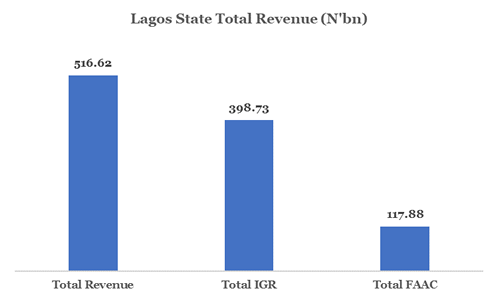
Source: NBS,Proshare Research
Lagos State IGR
Inunderstanding the state's current revenue structure its is noteworthy torealize that the state's major source of internally generated revenue is itsPAYE which accounts for about 68% of the state's IGR, while revenue generatedfrom other taxes as well as from MDAs (Ministries, Departments and Agencies)accounts for 16% and 10% of IGR respectively (see Chart 56).For the state to position properly for a post-COVID-19 world, its must rethinkIGR composition by reducing PAYE to roughly 30% of IGR and increasing theproportion of IGR from taxes, levies, fines and fees to about 70% of stateIGR.
Chart 56: LagosState IGR (N'bn) 2019
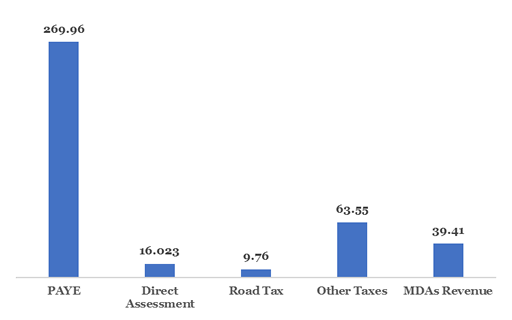
Source: NBS,Proshare Research
Lagos State Domestic Debt
Lagos state's domestic debtstood at N444.23bn as of December 2019, a reduction from N530.24bn as ofDecember 2018.
Chart 57: LagosState Domestic Debt (N'bn) 2015-2019
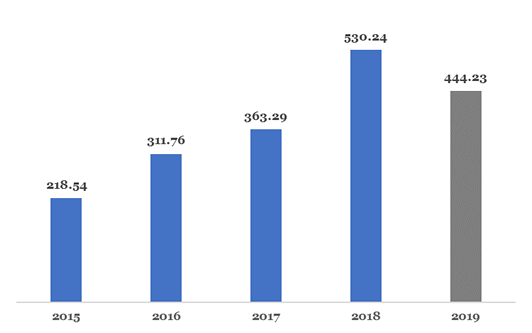
Source: NBS,Proshare Research
Despite the drop in itsdomestic debt from N530.24bn in December 2018 to N444.23bn in December 2019,the size of the was worrisome as it poses a potential burden for futureadministrations/generations (see Chart 55).
Lagos State External Debt
Lagos state's external debtdeclined to $1.4bn in December 2019 from $1.43bn in December 2018. The fall inthe debt may be considered desirable but it still leaves the state with a majorforeign exchange exposure. The fact that most of the state's revenue is nairadenominated, the large foreign debt exposure threatens the state's fiscalbalance with foreign exchange translation risks and could result in a downgradeof its credit rating and a rise in its cost of finance.
Chart 58: LagosState External Debt ($'bn) 2015-2019
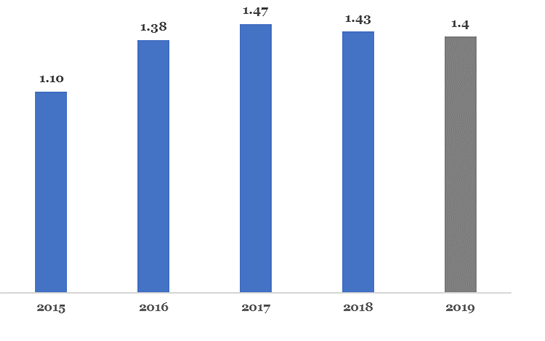
Source: NBS,Proshare Research
Illustration 16: Lagos State-Growing A Post COVID-19 Economy
The State of Osun
Osun state is on the oppositeside of the revenue pendulum from Lagos state. The state recorded the lowestIGR and the lowest revenue in the South-West region in 2019. It posted an IGRof N17.92bn in 2019, while its totalFAAC received in 2019 was N24.2bn in 2019.
The State of Osun is a darkhorse on a white canvass. The opportunities of the state well outstrip itschallenges, but its present fiscal structure robs it of development, growth andhuman well-being. Its large public sector (over 2.2mpeople) relative to the overall population (around 5.5m people) suggests heavyrecurrent public sector payments by way of salaries and other emoluments andlarge monthly pension and gratuity outflows.
LowHanging Fruits
Tokick off an aggressive rebuilding of the Osun economy with limited publicfinancial outflows the government may need to do the following:
- Take inventory of all idlestate government enterprise assets and prepare them for private-sectoracquisition
- Convert the statescultural and faith-based advantages into economic opportunities through tourism
- Upgrade the states AsoOke industry into a medium-sized private sector-led joint venture thatinvolves clothing design, manufacturing, fashion fairs and export. Patents andcopyrights would be obtained by the government and kept as contingent assets.
- The cola nut business ofEde would be upgraded and will form the basis of a major exportable colanuttrade
Thereal potential of Osun State follows from a clear vision to achieving thefollowing:
- Building a State with astrong AgriTech framework that integrates agriculture and technology in amanner that brings about "Green Economy" efficiency, effectiveness andinnovation. Producing agricultural throughputs at globally competitive pricesand quality will bring revenue streams that reduce State Debt -to-Revenueratios and Improve IGR-to-Total Revenue numbers.
- Improving specializedhuman capital skills in the areas of AgriTech, Mining and Commodities,including expertise in commodities trading, product derivatives and forwardand futures contracts trading. The economy of the future is knowledge-basedand reliance on raw commodities and minerals would push the State to the leastrewarding end of the future production and service value chains. The State ofOsun must prepare itself for 4IR. The fourth Industrial Revolution (4IR) istechnology and science-driven requiring education in the State of Osun to beremodelled in a way that is fit-for-purpose in an era of disruptiveeconomic competition. Roadshows about the State's agricultural resources andmining potential are only as useful as they feed into a narrative that showshow these resources can support a new technological paradigm that createsuncommon value by way of technology.
- LeveragingReligious/Spiritual Tourism is the 'soft' aspect of the Osun economy that hasbeen either intentionally or unintentionally been ignored. The State of Osun isknown to have the largest number of hills in the South West associated with,allegedly efficacious, spiritual essence and power. The various 'Okes' known as magnets for religious faithful seeking communion with God possess an underlyingvalue that is yet to be explored. Also, festivals such as the 'Osun Osogbo' andother annual traditional fiestas need to be harnessed in a way that attracts aglobal tourist audience beyond the present numbers. Religious/Spiritual tourismcould ignite cash flows well beyond past conservative calculations.
- Creating IndustrialClusters/Parks with Tech Incubators that leverage the verdant agriculturallandscape of Osun to build digital businesses that scale agriculturalmarketing, sales and production. The AgriTech valley would collaborate withcoastal economies to build agricultural export pipelines that are both virtualand physical that merge into a helix-like interchange of economic value.If structured and implemented properly, the attendant Agricultural Tourismwould create a unique stream of investing and operational cash flows that couldorganically increase the State's GDP by at least another 10% or N147.5bn basedon available National Bureau of Statistics (NBS) 2018 data.
StateGDP and Its Imperatives
AcceleratingIndustrial Development and Increased Industrial Activities are linked toeconomic growth, trade and market development. As a component of the States GDPtrade has been largely consistent in its rising trend of contribution to theeconomic size of the State of Osun. This stands at 5.8% in 2017, from 5.55 in2014. Trade alone is the third-largest contributor to State GDP (estimated atN1.47trn in 2018) and the second-largest contributor to the monetary value ofservice sector output in 2017.
TheGDP numbers open up a myriad of potential opportunities to investors in theareas of:
- Modern Farming
- Manufacturing
- Logistics
- Storage
- Warehousing
- Value Chain Management
- Tech Conference Centres
- Infrastructure Developmentet al.
However,these potential business growth areas depend on new frameworks and not ageingfiscal and business growth models of the past. These traditional businesseswill need to be reworked within a 4IR mindset. The State of Osun will need toRethink the past, Reconsider the present and Reimagine its Future if it isgoing to make a success of the transformation of the State's economy between2020 and 2023 (see illustration 17).
Illustration17: The State of OsunEconomy; Rethinking Fiscal Strategy
TheState's fiscal condition must inspire the confidence of private investors whoneed to buy into a strong fiscal narrative so that they can match the fiscaldiscipline and foresight of the State government with the experience and cashof their own, as they align their local business plans with that of the StateGovernment. Hard data tell the best stories of future businessopportunities and outlook, government speeches are good but they are crafted toinspire hope and as American Army General, Gordon R. Sullivan (Rtd.), oncenoted, "hope is not a method".
Acritical component of the growth strategy for the State of Osun over the nextfew months should be to drive a rapid socio-economic data gathering, collation,organization and analysis process that provides investors with broad and deepdata upon which they can base their investment decisions.
Indeed,with credible data available for interrogation and review, the business casebecomes easier to establish and the cost of attracting foreign and localinvestors would decline sizably. It must be observed that Investorsare not philanthropists they expect to make reasonable returns on theirinvestments and so, the data upon which critical investment decisions are madeis fundamental to attracting their money.
Withthe data available and registration and licensing of businesses made easy, TheState of Osun should see investments in the following areas if the 4IR mindsetis adopted:
- Industrial Parks/Estates
- Shopping Malls
- International ConferenceCentres
- Warehousing Facilities
- Commodity Storage Silos
- Inland Container Ports
- Housing Estates
- Health /Religious Resorts
Thebenefit of the limitations of the State of Osun economy in hindsight shouldstrategically spark the required action plans for the new economy with thebenefit of foresight (see illustration 18)
Illustration18: The Benefits of Hindsight and Foresight Based on Insight
Osun State Revenue
Osun states total revenue grewby 26.87% in 2019. Osun recorded total revenue of N42.14bn in 2019, animprovement from total revenue of N33.22bn in 2018. It mainly relies on revenuederived from its FAAC. In 2019, its total FAAC received was N24.2bn while itsIGR was N17.92bn.
Chart 59: OsunState Total Revenue (N'bn)
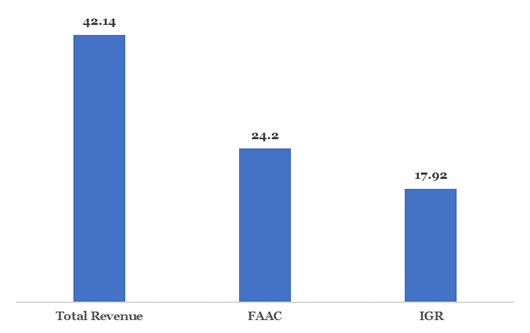
Source: NBS,Proshare Research
Osun State IGR
Osun State recorded a totalIGR of N17.92bn in 2019. The breakdown of Osun states' IGR reveals that itsmajor source of revenue comes from its MDA's while PAYE was its second main sourceof revenue. Its MDA's generated a total of N8.75bn in 2019 while it generated atotal of N7.85bn from PAYE.
Chart 60: OsunState IGR (N'bn) Breakdown
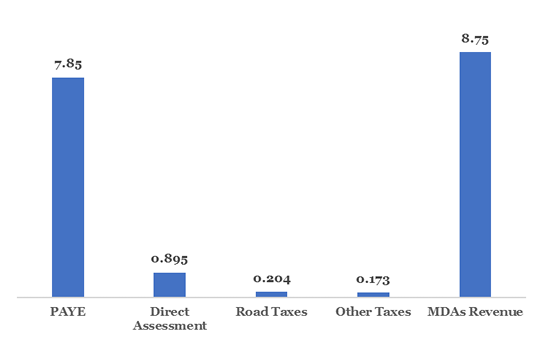
Source: NBS,Proshare Research
Osun State Domestic Debt
The state's domestic debt declinedto N138.65bn in December 2019 from N148.1bn in December 2018. Given its lowlevel of total revenue, it is expected that its domestic debt might continue torise in the future.
Chart 61: OsunState Domestic Debt (N'bn) 2015-2019
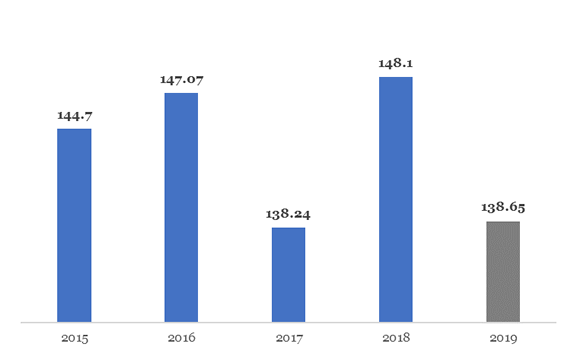
Source: DMO,Proshare Research
Osun State External Debt
Osun state's external debtdeclined to $95.45m in December 2019 from $103.26bn in December 2018.
Chart 62: Osun StateExternal Debt ($'m) 2015-2019
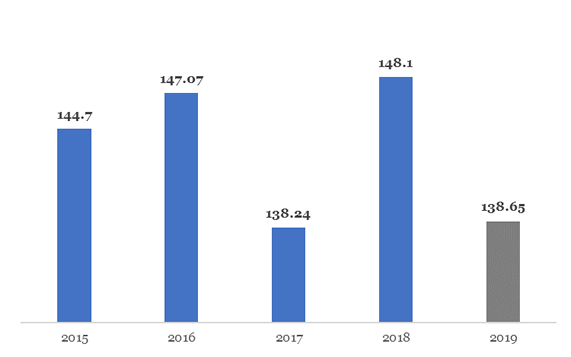
Source: DMO,Proshare Research
FCT
The FCT is known for a largenumber of commercial activities that take place in its territory. It had thehighest total revenue of N146.47bn in the North-Central region. But forsustainability, the territory needs to turn itself into a conference and publicpolicy mecca on the African continent. The federal capital needs to be morethan a public service showpiece and more of a 21st-century communityprepared to be the hotbed of policy and ideas for the African continent. Thecapital needs to be a city choke-full of think tanks and world-class librariesand schools. To support this thefollowing would be required:
- The city's urban mass transitsystem needs to be upgraded. Abuja's transport system iscurrently less than is required for a first-class continental conference andresearch hub.
- The city requires a network ofCCTVs in major areas that serve as gathering destinations for large crowds. A post-COVID-19 era would see buses carrying 20 people withsufficient distancing in compliance with the new social ethos. This means alarger number of crowd 'pockets' would need to be handled around the clock.
- Abuja needs to transmute intoa 24-hour city. The city would require around the clockbus transport services, pharmacies, cinemas, theatres, restaurants, and retailmarkets. The 24-hour economy never sleeps so security in the capital would haveto be top-notch.
- The FCT administration wouldhave to leverage the domestic capital market to provide the necessarystructures to build the city into the strategic go-to policy and researchdestination of the continent.
FCT Total Revenue
FCT total revenue grew by5.61% in 2019. Its revenue rose to N146.47bn in 2019 from N138.69 in 2018. The major source of its revenuewas from its IGR which amounted to N74.56bn (50.91% of total revenue) in 2019while its allocated FAAC in 2019 was N71.91bn (49.09% of total revenue).
Chart 63: FCTTotal Revenue (N'bn) 2019
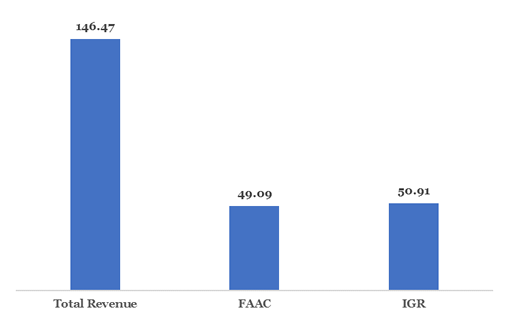
Source: NBS,Proshare Research
FCT State IGR
The FCT gets all its IGR fromtaxes levied by the states. The major chunk of the tax income comes from PAYEaccounting for N65.75bn of the total IGR recorded in 2019 (see Chart 64).
Chart 64: FCT IGR(N'bn) 2019
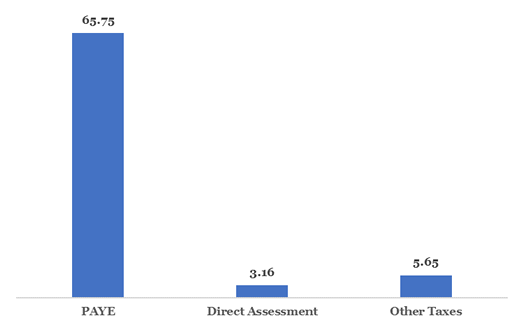
Source: NBS,Proshare Research
FCT Domestic Debt
FCT's domestic debt declinedby 34.1% in 2019. FCT domestic debt as of December 2019 stood at N108.17bn adecline from a domestic debt of N164.25bn in December 2018.
Chart 65: FCTDomestic Debt (N'bn) 2015-2019
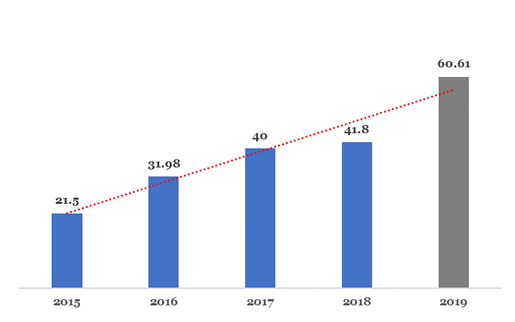
Source: DMO,Proshare Research
FCT External Debt
FCT's external debt declinedby -4.43% in 2019. FCT's external debt declined to $30.44m in December 2019from $31.85m in December 2018 (see Chart 66).
Chart 66: FCTExternal Debt ($'m) 2015-2019
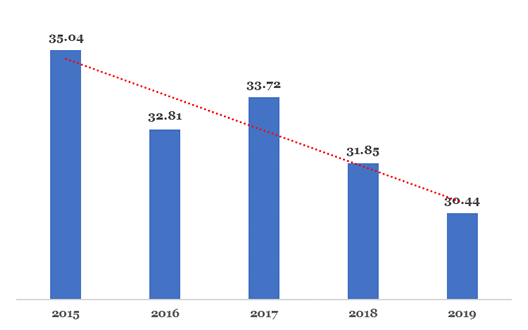
Source: DMO,Proshare Research
Niger State
Niger state recorded a sum of N69.21bnas revenue in 2019, which was the third in its region. The state relies mainlyon its FAAC allocation as its source of revenue.
Niger State Total Revenue
Niger state revenue grew by1.85% in 2019. Its total revenue in 2019 was N69.21bn, an increase fromN67.95bn in 2018. Its allocated FAAC accounted for 81.56% (N56.45bn) of itstotal revenue while its IGR accounted for 18.44% (N12.77bn) of its totalrevenue (see Chart 67).
Chart 67: NigerState Total Revenue (N'bn) 2019
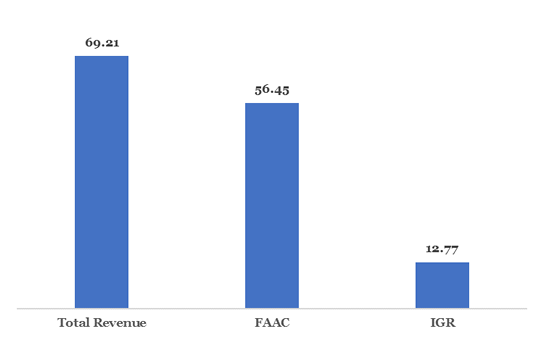
Source: NBS,Proshare Research
Niger State IGR
Niger State's major source ofIGR comes from the taxes it levied, with a major chunk from 'other taxes'. Itearned N7.07bn from other taxes while it earned N4.8bn from PAYE (see Chart 68).
Chart 68: Niger StateIGR (N'bn) Breakdown 2019
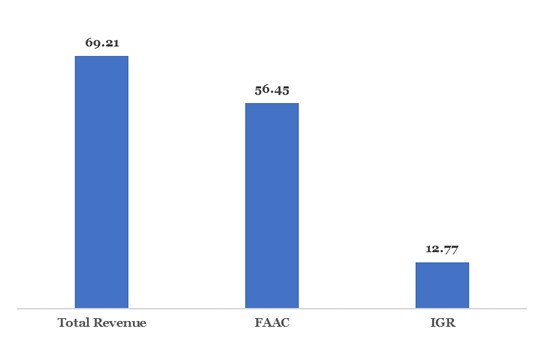
Source: NBS,Proshare Research
Niger State Domestic Debt
Niger state domestic debt grewby 45% in 2019. Its domestic debt recorded an upward trend from 2015 to 2019.Niger state domestic debt has continuously been on the rise since December2015. Its domestic debt peaked at N60.61bn in December 2019 from N41.8bn inDecember 2018 (see Chart 69).
Chart 69: NigerState Domestic Debt (N'bn) 2015-2019
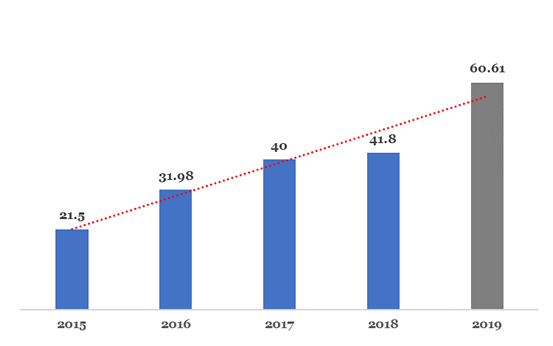
Source: DMO, Proshare Research
Niger State External Debt
Niger State's external debtpeaked at $69.99m in December 2019 from $61.35m in December 2018. Its externaldebt has continuously been on the rise since December 2015 (see Chart 70).
Chart 70: NigerState External Debt (N'm) 2015-2019
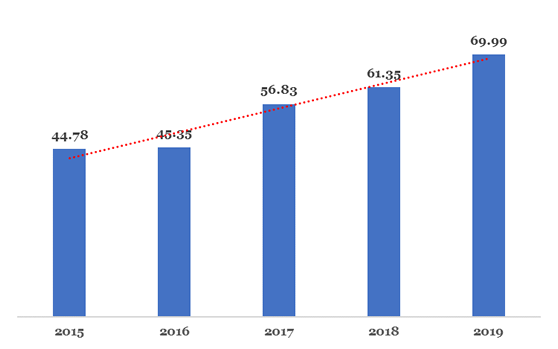
Source: DMO, Proshare Research
Borno State
Borno state is characterizedby a low level of commercial activity as well as its high level of insecuritywhich has impeded the growth of its economy.
Borno State Total Revenue
Borno state's major source ofrevenue in 2019 was its FAAC. Its FAAC accounted for 88.30% of its totalrevenue while its IGR accounted for 11.70% of total revenue.
Chart 71: BornoState Total Revenue
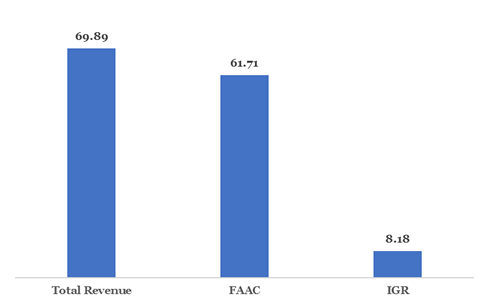
Source: NBS, Proshare Research
Borno State IGR
The major source of Bornostate IGR is gotten from its PAYE. In 2019, its PAYE accounted for N4.19bnwhile the revenue generated from the MDA's was N2.3bn (see Chart 72).
Chart 72: BornoState IGR (N'bn) Breakdown 2019
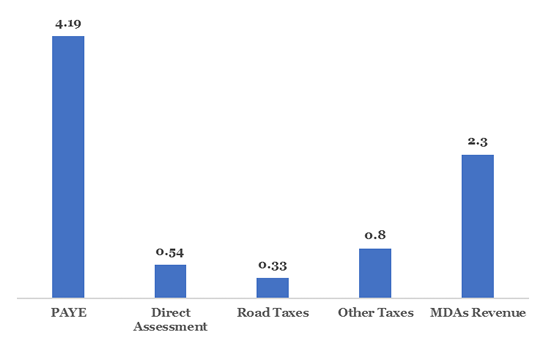
Source: NBS,Proshare Research
Borno State Domestic Debt
Borno state domestic debt grewby 22.1% in 2019. Its domestic debt peaked at its highest in December 2019. Itsdebt increased to N83.6bn in December 2019 from N68.38bn in December 2018 (see Chart 73).
Chart 73: BornoState Domestic Debt (N'bn) 2015-2019
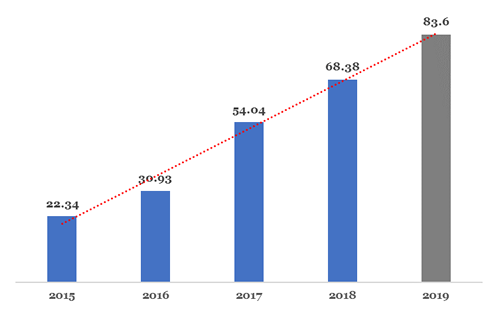
Source: DMO,Proshare Research
Borno State External Debt
Borno state external debtdeclined by 20.86% in 2019. Its external debt has a downward trend. Itsexternal debt declined from $21.62m in 2018 to $17.11 Borno state recorded itslowest external debt of $17.11m in December 2019 (see Chart 74).
Chart 74: BornoState External Debt ($'m) 2015-2019
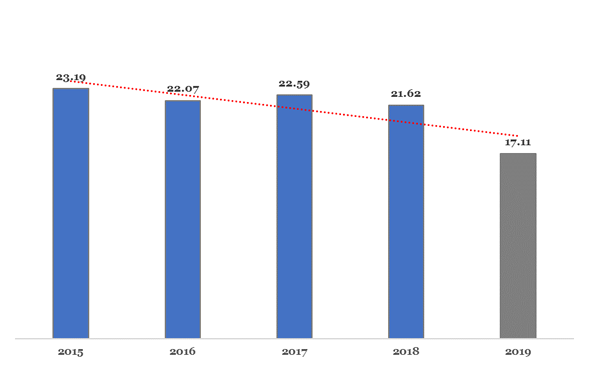
Source: DMO,Proshare Research
Adamawa State
Adamawa in most recent timeshas been overwhelmed by banditry. The state relies significantly on revenuefrom FAAC allocation. The state's huge dependence on FAAC is abnormally large.The state is potentially one of the country's breadbaskets. With rich andverdant land and a strong farming culture, the state has massive potential todrive an agricultural revolution in the country.
Thinking Strategically
Adamawa State can attractlarge scale agricultural companies into the state if its philosophy is privatesector-led. The COVID-19 period provides a great opportunity for the state toupscale agriculture through the use of technology a major factor in breakingpoverty cycles according to the late Professor Clayton Christensen, EfosaOjomo, and Karen Dillon in their award-winning book the "Prosperity Paradox".
Adamawa may need to do thefollowing:
- Shift to more mechanized modesof farming
- Adopt cattle ranching as asystem of nurturing animal protein and providing leather as inputs for thefashion, automobile, and furniture industries. The cattle reared could alsoprovide milk and yogurt as in-puts to other businesses such as confectionary.
- Mining activities should beformalized with artisanal activities eased out as larger and better-equippedcorporations are encouraged to mine.
Adamawa State Revenue
Adamawa state derived 83.28%of its total revenue from FAAC while 16.72% of its revenue was derived from itsIGR in 2019. Its total revenue earned in 2019 was N58.04bn. Its allocated FAACin 2019 was N48.34bn while its IGR was N9.7bn (see Chart 75).
Chart 75: AdamawaState Total Revenue (N'bn) 2019
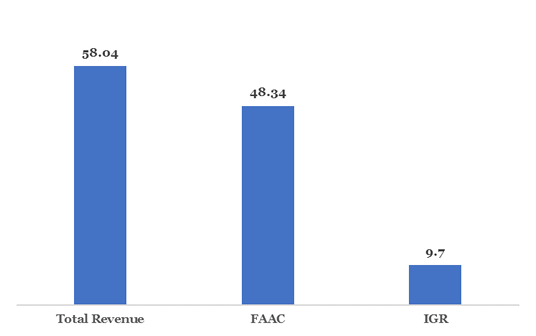
Source:NBS,Proshare Research
Adamawa State IGR
The major source of its IGR isits PAYE. In 2019, Adamawa state recorded a PAYE of N5.75bn while its MDA'sgenerated a total of N3.03bn (see Chart 76).
Chart 76: AdamawaState IGR (N'bn) Breakdown 2019
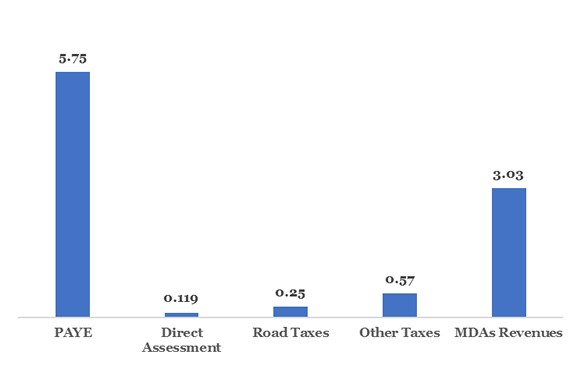
Source: NBS, Proshare Research
Adamawa State Domestic Debt
Adamawa state's domestic debthas consistently risen since December 2015. Adamawa state recorded its highestdomestic debt of N102.41bn in December 2019. Its domestic debt rose fromN89.66bn in December 2018 to N102.41bn in December 2019.
Chart 77: AdamawaState Domestic Debt (N'bn) 2015-2019
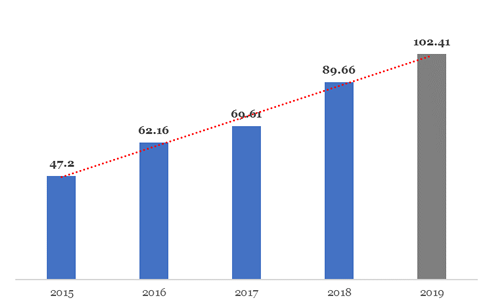
Source: DMO,Proshare Research
Adamawa State External Debt
Adamawa state's external debthas an upward trend. Its external debt rose consistently each year and peakedat $108.76m in December 2019. Its external debt rose from $97.79m in December2018 to $108.76m in December 2018 (see Chart 78).
Chart 78: AdamawaState External Debt ($'m) 2015-2019
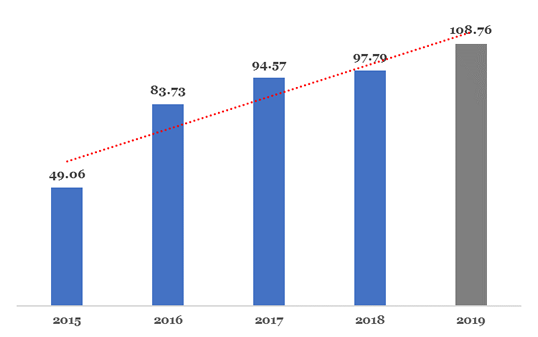
Source: DMO,Proshare Researchn 2019, its FAAC allocatedaccounted for 77.89% of its total revenue while its IGR was 22.11% of its totalrevenue.
Abia State Total Revenue
Abia state's total revenuedeclined by -4.78% to N66.81bn in 2019from N70.16bn in 2018. Its FAAC accounted for 77.89% of total revenue while itsIGR accounted for 22.11% (see Chart 79).
Chart 79: AbiaState Total Revenue (N'bn) Breakdown 2019
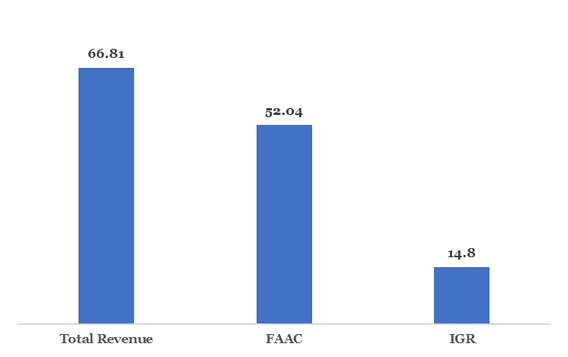
Source: NBS,Proshare Research
Abia State IGR
Its two major sources of IGRin 2019 were its PAYE and revenue derived from its MDA's. Revenue derived fromPAYE and MDAs in 2019 were N5.91bn and N5.8bn respectively.
Chart 80: AbiaState IGR (N'bn) Breakdown 2019
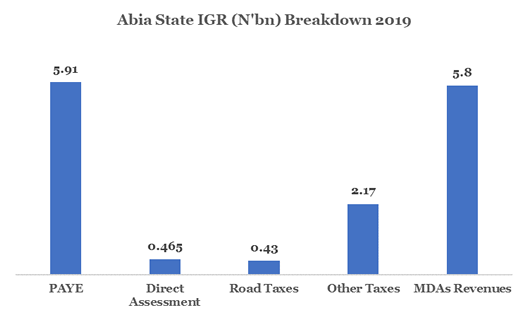
Source: NBS,Proshare Research
Abia State Domestic Debt
Abia state had an upwardtrending domestic debt, as its domestic debt increased yearly. Its highestdomestic debt recorded was N68.76bn in December 2019. Its domestic debtincreased from N67.02bn in December 2018 to N68.76bn in December 2019 (see Chart 81).
Chart 81: AbiaState Domestic Debt (N'bn) 2015-2019
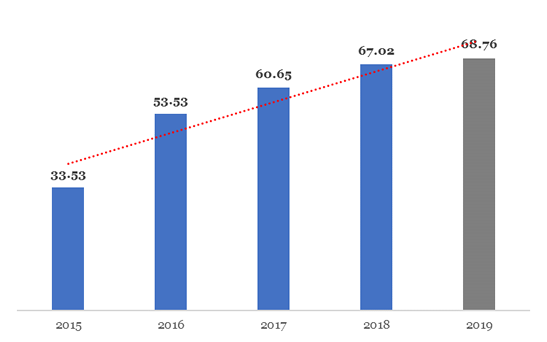
Source: DMO,Proshare Research
Abia State External Debt
Abia state external debtdeclined by -2.02% in December 2019. Its external debt declined from $98.58m inDecember 2018 to $96.59m in December 2019 (see Chart 82).
Chart 82: Abia State External Debt ($'m)2015-2019
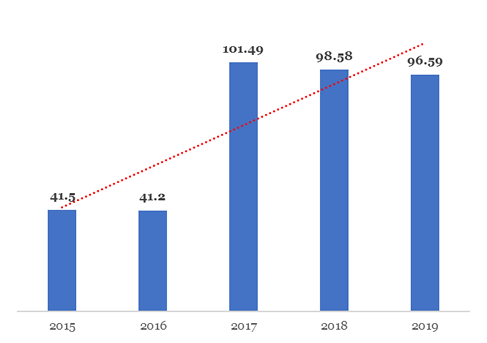
Source: DMO,Proshare Research
Anambra State
Anambra state recorded anincrease in its debts and revenue in 2019. Its total revenue increased by 7.66%in 2019. Its main source of its IGR is its PAYE.
Anambra State Total Revenue
Anambra state's total revenueincreased by 7.66% in 2019. Its total revenue increased from N74.56bn in 2018to N80.26bn in 2019. The major source of its revenue in 2019 was from its FAAC.Its FAAC in 2019 was N53.89bn (67.15% of total revenue) while its IGR wasN26.37bn (32.85% of total revenue).
Chart 83: Anambra State Total Revenue (N'bn) Breakdown 2019
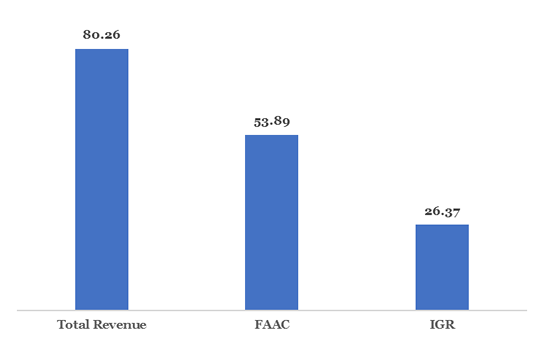
Source: NBS,Proshare Research
Anambra State IGR
Anambra state's two majorsources of its revenues are its PAYE and MDAs revenue. In 2019, its PAYEaccounted for N11.19bn of total revenue while its MDAs revenue accounted forN10.24bn of total revenue (see Chart 84).
Chart 84: Anambra State IGR (N'bn) Breakdown 2019
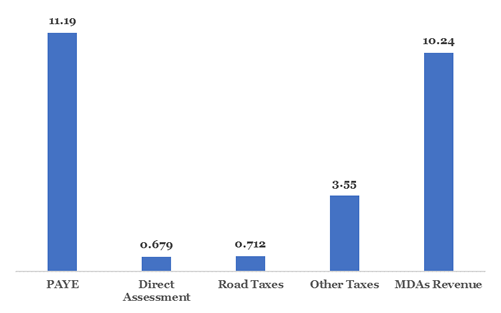
Source: NBS,Proshare Research
Anambra State Domestic Debt
Anambra state's domestic debtrose significantly from N2.61bn in December 2017 to N33.92bn in December 2018.Its highest domestic debt of N33.92bn was recorded in December 2019 (see Chart 85).
Chart 85: AnambraState Domestic Debt (N'bn) 2015-2019
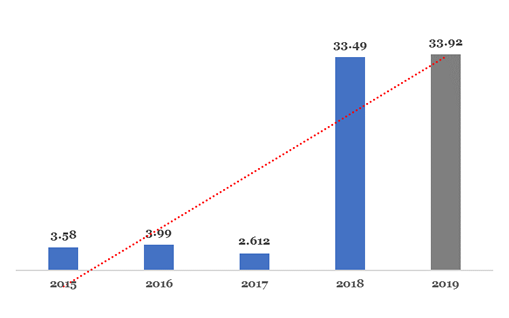
Source: DMO,Proshare Research
Anambra State External Debt ($'m) 2015-2019
Anambra state's external debtgrew slightly by 0.97% in 2019. Its external debt rose consistently fromDecember 2015 to December 2019. Its highest external debt recorded was $108.08min December 2019 (see Chart 86).
Chart 86: AnambraState External Debt ($'mn) 2015-2019
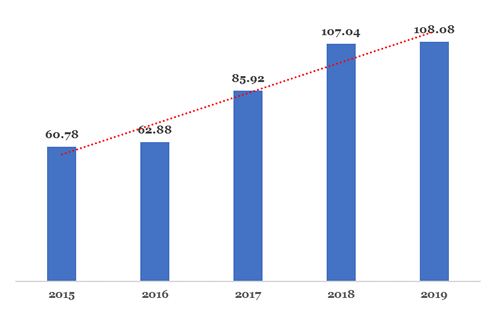
Source: DMO,Proshare Research
Rivers State
River state is characterizedby large economic activities. It's the second state in Nigeria with the highestamount of total revenue earned in 2019.
Rivers State Total Revenue
Its total revenue increased by4.71% in 2019. Its total revenue rose from N285.41bn in 2018 to N298.85bn in2019. Rivers state recorded a total FAAC allocation of N158.45bn and an IGR ofN140.4bn in 2019 (see Chart 87).
Chart 87: RiversState Total Revenue (N'bn) 2019
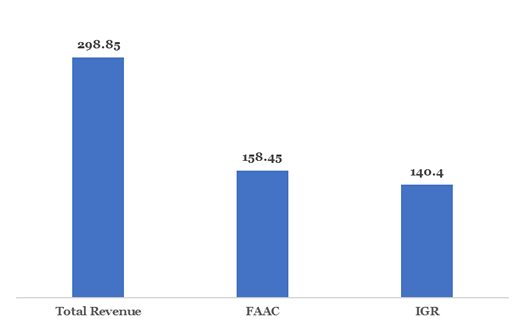
Source: NBS,Proshare Research
Rivers State IGR
Rivers State's major source ofrevenue was from PAYE and other taxes. In 2019, its PAYE earned was N101.09bn while its revenue earned fromother taxes was N21.27bn.
Chart 88: RiversState IGR (N'bn) 2019
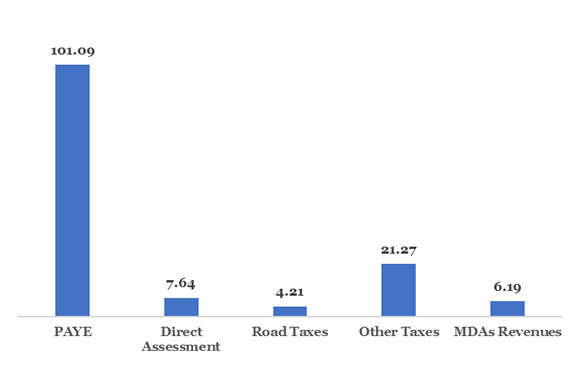
Source: DMO,Proshare Research
Rivers State Domestic Debt
Rivers state domestic debt wasupward trending from December 2015 to December 2019. Its domestic debt peakedat N266.94bn in December 2019. Its domestic debt rose from N225.59bn inDecember 2018 to N266.94bn in December 2019 (see Chart 89).
Chart 89: RiversState Domestic Debt (N'bn) 2015-2019
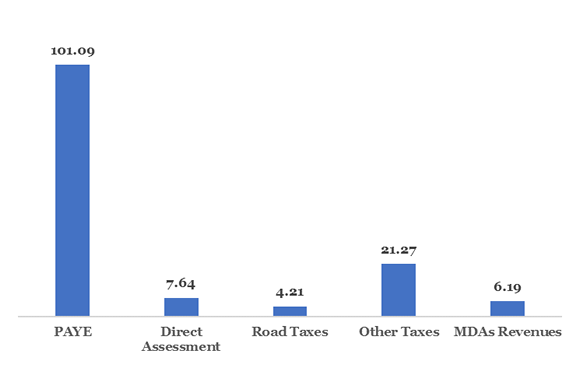
Source: DMO,Proshare Research
Rivers State External Debt ($'m)2015-2019
Rivers state had was upwardtrending external debt from December 2015 to December 2019. Its external debtrose slightly by 0.19% from $78.28m in December 2018 to $78.43m in December2019 (see Chart 90).
Chart 90: RiversState External Debt ($'m) 2015-2019
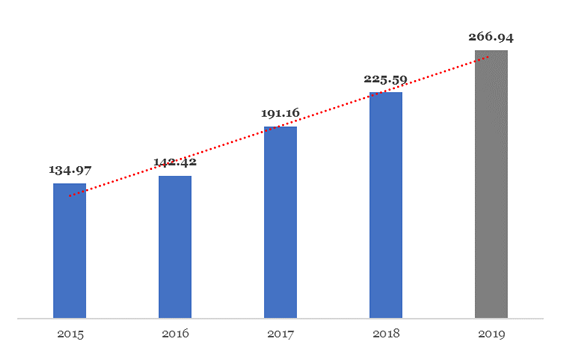
Source: DMO,Proshare Research
Delta State
Although the state is richlyendowed with various resources, especially oil, the resources are yet to befully harnessed to significantly improve the welfare of the people. Besidesabundant oil and gas, the state has a variety of other resources and faciltieswhich gives it comparative advantage over other states in the Federation. Theseresources include: solid minerals such as silica, lignite and kaolin; abundantland for cropping and plantation agriculture; forest resources; water bodiesfor recreation and tourism; aquatic resources with vast potentials foraquaculture, several port, etc.
The Delta states economy isprimarily dependent on its revenue derived from FAAC. Its primary source of itsIGR is its PAYE
Delta State Total Revenue
In 2019, Delta state recordedan increase in its total revenue by 4.37%. Its total revenue increased fromN272.07bn in 2018 to N283.96bn in 2019. Delta states major revenue comes fromits FAAC. Its FAAC accounted for 77.22% of its total revenue while its IGRaccounted for 22.78% of its total revenue in 2019. In 2019, it recorded a total allocated FAACof N219.28bn while its IGR was N64.68bn.
Chart 91: Delta State Total Revenue (N'bn) Breakdown2019
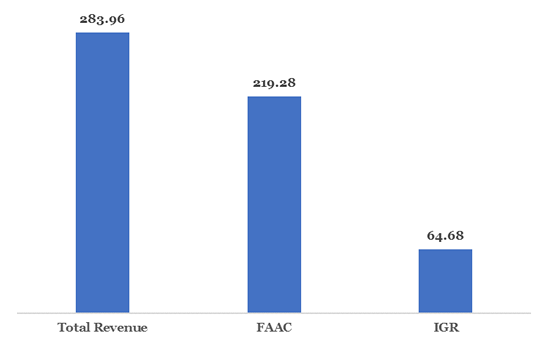
Source: NBS,Proshare Research
Delta State IGR Breakdown
Delta's state major source ofIGR is its PAYE and its MDAs. In 2019, it derived N47.4bn from its PAYE while N8.01bn wasderived from its MDAs.
Chart 92: DeltaState IGR (N'bn) Breakdown 2019
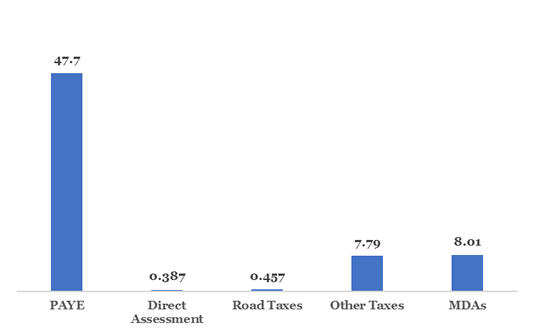
Source: NBS,Proshare Research
Delta State Domestic Debt
Delta state domestic debtincreased marginally by 2.22% in December 2019. Its domestic debt increasedfrom N228.81bn in December 2018 to N233.89bn in December 2019 (see Chart 93).
Chart 93: DeltaState Domestic Debt (N'bn) 2015-2019
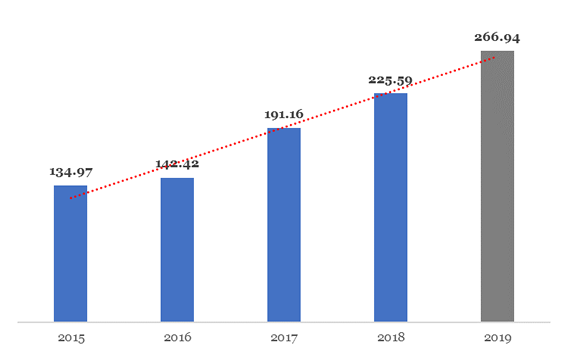
Source: DMO,Proshare Research
Delta State External Debt
Delta state external debtdeclined marginally by -1.17% in December 2019. Its external debt declined from$63.27m in December 2019 to $62.53m in December 2018 (see Chart 94).
Chart 94: DeltaState External Debt (N'bn) 2015-2019
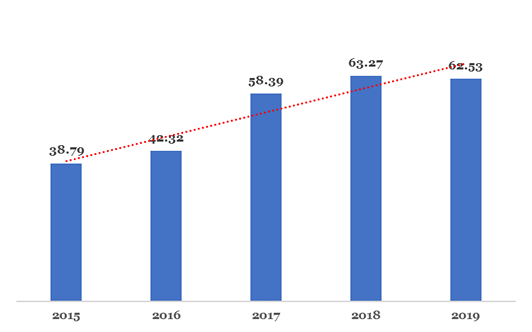
Source: DMO,Proshare Research
Kaduna State
Kaduna state is an industrialcentre of Northern Nigeria and the Middle Belt, Manufacturing products liketextiles, machinery, steel, aluminum,petroleum products and bearings
Kaduna State Total Revenue
Kaduna states total revenuegrew by 14% in 2019. Its total revenueincreased to N112.06bn in 2019 from N98.3bn in 2018. Its major source ofrevenue was revenue derived from FAAC allocation. In 2019, its total FAACallocated was N67.1bn (59.88% of total revenue) while its IGR was N44.96bn(40.12% of total revenue).
Chart 95: KadunaState Total Revenue (N'bn) Breakdown 2019
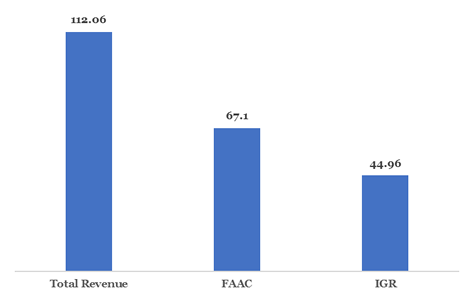
Source: NBS,Proshare Research
Kaduna State IGR
Kaduna state's major source ofits IGR is derived from its MDAs and PAYE. In 2019, its MDAs generated revenueof N19.01bn while N11.69bn was generated from PAYE (see Chart 96).
Chart 96: Kaduna State IGR (N'bn) Breakdown 2019
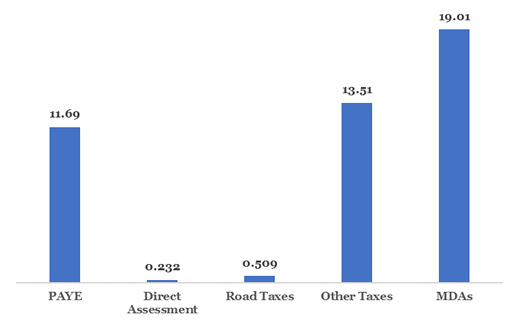
Source: NBS,Proshare Research
Kaduna State Domestic Debt
Kaduna state domestic debt wasN78.9bn as of December 2019. Its domestic debt declined by -6.78% in 2019, itsdomestic debt declined from N84.64bn in December 2018 to N78.9bn in December2019 (see Chart 97).
Chart 97: KadunaState Domestic Debt (N'bn) 2015-2019
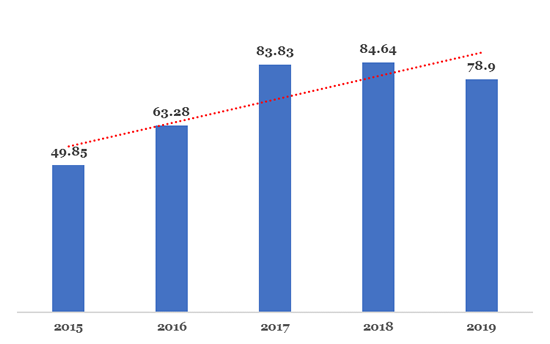
Source: DMO,Proshare Research
Kaduna State External Debt
Kaduna state's external debtgrew by 144.13% in December 2019. Its external debt increased from $227.25m inDecember 2018 to $554.78m in December 2019 (see Chart 98).
Chart 98: KadunaState External Debt ($'m) 2015-2019
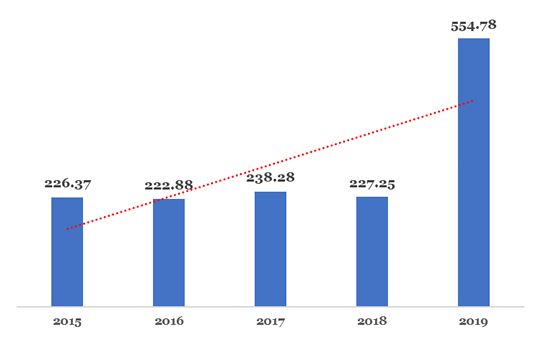
Source: DMO,Proshare Research
Sokoto State
Sokoto State Total Revenue
Sokoto state's total revenueincreased slightly in 2019. Its total revenue increased by 1.72% in 2019. Itstotal revenue increased from N73.2bn in 2018 to N74.48bn in 2019. The majorsource of its revenue was its FAAC, which accounted for 74.48% of the state'stotal revenue and 25.52% of its total revenue was generated from its FAAC. In2019, its total FAAC allocated was N55.48bn while its IGR was N19.01bn (see Chart 99).
Chart 99: SokotoState Total Revenue (N'bn) Breakdown 2019
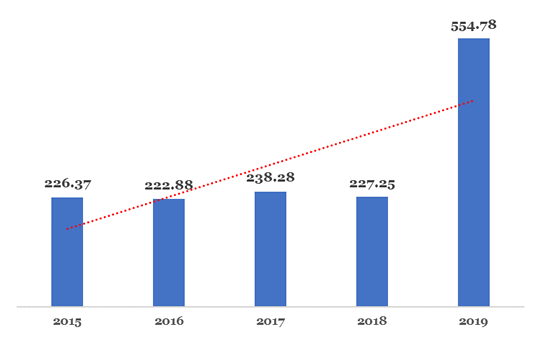
Source: NBS,Proshare Research
Sokoto State IGR
Sokoto state's major source ofits revenue was derived from Other taxes and PAYE. In 2019, revenue derivedfrom other taxes was N11.61bn while revenue derived from PAYE was N5.95bn (see Chart 100).
Chart 100: SokotoState IGR (N'bn) Breakdown 2019
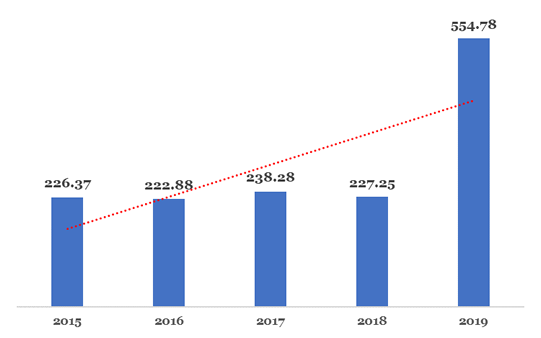
Source: NBS,Proshare Research
Sokoto State Domestic Debt
Sokoto state domestic debtincreased significantly by 23.58% in December 2019. Its domestic debt had anupward trend and increased consistently yearly, its domestic debt increasedfrom N38.6bn in December 2018 to N47.7bn in December 2019 (see Chart 101)
Chart 101: SokotoState Domestic Debt (N'bn) 2015-2019
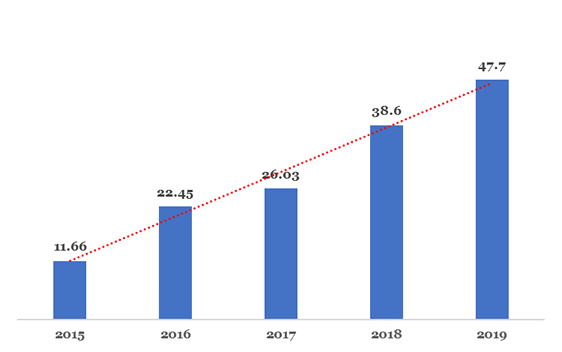
Source: DMO,Proshare Research
Sokoto State External Debt
Its external debt declinedslightly by -3.60% in December 2019. Its external debt declined from $39.22m inDecember 2018 to $37.81m in December 2019 (see Chart 102).
Chart 102: SokotoState External Debt ($'m) 2015-2019
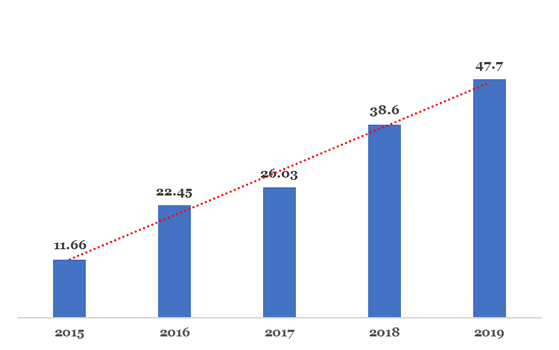
Source: DMO,Proshare Research
Table 20: Debt to Revenue PerState-A "COVID" chill
The high debt to revenue ratio across the various states ofthe federation is another source of concern. Accordingto the DMO guidelines on borrowing, no state should have outstanding loans thatare more than 50% of their total revenues in the previous 12 months.
However, statisticsprovided by the FRC in its 2018 Annual Report show that all the states haddebts beyond 50% of their previous 12-month revenues. Lagos Staterecorded the highest debt to revenue ratio. It had net revenue of N119.02bn,with a total debt of N968.16bn. This left the state with a debt to revenueratio of 813.41%. It also means that the state had gone beyond the DMO limit by763.41%. Lagos was quickly followed by Osun State with a debt to revenue ratioof 781.7%. While it had net revenue of N22.84bn, its total public debt stood atN178.52bn.
This means that the state had a debt torevenue ratio of 781.71% and had gone beyond the limit set by the DMO by731.71%. Other top states in terms of highdebt to revenue ratios include Cross River, Ekiti, Ogun, Plateau, Edo, Bauchi,Adamawa, Kaduna, Nasarawa, Imo and Oyo states. The spread of the coronavirus isprojected to worsen the state's debt to revenue ratio in 2020 (seeTable 20).
Illustration 19: Understanding the Challenges, Mining the Opportunities
Related Reports (PDF)
1. Download the Full PDF Report - Coronanomics and the Nigerian Economy, June 06, 2020
2. Executive Summary PDF - Proshare, June 06, 2020
Related News
1. Coronanomics (17) - Sub-Nationals: Digging Deep, Wide and Hard
2. Coronanomics (16) - Deconstructing Nigeria's Trade
3. Coronanomics (15) - Nigeria's National Income - Understanding The BlackBox
4. Coronanomics(14) - Nigeria's Debt Profile - Swimming in Deep Waters
5. Coronanomics (13) -Nigeria: The Budget, The People and Poverty
6. Coronanomics(12) - The Nigerian Economy in Relief
7. Coronanomics(11) - Fighting A Virus - Africa's Equity Market
8. Coronanomics (10) -Impact on the Travel and Tourism Sector
9. Coronanomics (9) - China, US-Africa Bilateral Trade Data -Changing Partners
10. Coronanomics (8) - African Economies - An Emerging Market Fight Back
11. Coronanomics (7) - Global Policy Responses Against theNegative Impact of COVID-19
12. Coronanomics (6) - Global Stock Market - Top 3 DeclinersDipped By 0ver 26% YTD
13. Coronanomics (5) - Global Oil Market - Spinning Around AVortex
14. Coronanomics (4) - Chinese Economy and The Rest of theWorld
15. Coronanomics (3) - The Global Economy Spinning on aWishing Wheel
16. Coronanomics (2) - Easing Out of a Crisis
17. Coronanomics (1) - Understanding the Realities of anImpending Recession
Related Links and References
Related News - Opinions & Analysis
- An African Perspective on the impact of COVID-19 and the Response to it - FBNQuest
- Corporate, Financial Institution Downgrades On Pace for Record
- The Case Against High Interest Rates in Time of Contagion - Bola Tinubu
- The Coming Greater Depression of the 2020s
- Why the Global South Should Temper Expectations Over The Basel Convention Ban Amendment
- Of Q1'20 Economic Output and GDP Forecasts - Lessons from China
- Of Q1'20 Economic Output and GDP Forecasts - Lessons from China
- It's Time to Build - OpEd
- What Would the World Look Like after Coronavirus: Economically, Politically and Socially?
- Risk-Weight Variation Among Emerging Markets Banks Impedes Capital Comparisons
Related News - Reviews and Outlooks
- Coronavirus Crisis Impact on Jobs Could Outweigh GDP Impact
- Moody's Affirms Nigeria's B2 Ratings, Maintains Negative Outlook
- Fitch Revises Outlook on Kaduna State to Negative on Sovereign Rating Action; Affirms at 'B'
- Fitch Downgrades Lagos State to 'B' on Sovereign Rating Action; Outlook Negative
- Further Multi-Notch Sovereign Downgrades Are Probable in 2020
- Various Rating Actions On Nigerian Banks By S and P Following Sovereign Downgrade; Outlooks Stable
- Three Ratings Agencies, Now One Message
- Fitch Downgrades Nigeria to 'B'; Outlook Negative
- Nigerian Banks at Severe Risk from Oil Price Slump, Coronavirus
- Moody's Assigns Ratings to Dangote Cement Plc's DMTN Program and Proposed Series 1 Notes
- Macroeconomic Review Q1 2020: Steering a Fragile Economy in the Face of Uncertainties
- Fitch Downgrades 3 Nigerian Banks to 'B', Places All 10 Banks on Negative Watch
- Nigeria Long-Term Rating Lowered To ''B-'' On Weakening External Position
- Coronavirus to Weaken Sovereign Fiscal Positions; Track Record Matters
- Fiscal Space Limited for Many Sovereigns
- Rating Actions Taken On Several Corporate Issuers With Exposure To Nigeria
- Outlooks On Six Nigerian Banks Revised To Negative After Same Action On Sovereign
- Nigeria's Outlook Revised To Negative On Falling Foreign Exchange Reserves
Related News - Nigeria Economy
1. COVID-19 and the Construction Sector
2. The Lockdown - Food Scarcity and Social Unrest Looming
3. April 2020 Headline Inflation Will Cross 13.0% - FDC
4. Nigerian Economic Update: A Throw of the Dice
5. Guidelines and Recommendations: Reopening the Nigerian Economy
6. GDP By Income and Expenditure Approach Q4 2019 - Household Final Consumption Declined by -2.40%
7. Ahead of Tomorrow on WebTV: Discussions on COVID-19; Reinventing Nigeria's Economy
8. Nigeria Weekly Update: Short and Long Currency Cycles
9. Nigeria Needs A National Strategy To Integrate Factor Endowment Into A Plan - Prof. Utomi
10. A Surprising Boost to the FAAC Payout; April Payment Amount to N781bn
11. Ahead of Tomorrow on WebTV: Discussions on Repositioning Nigeria's Economy Beyond COVID-19
12. Impact of Privatization on Nigeria's Economy
13. Can Africa Afford COVID-19 Lockdowns? - Chukwuma Soludo
14. COVID-19; Nigeria Needs To Relax Foreign Exchange Management To Boost Industrialization - Dr. Yusuf
15. Nigeria's Economy After Oil: How Should We Prepare?
16. The Disruptive Impact of COVID-19
17. Nigeria's Impending Recession
18. Roadmap to Rebooting Nigeria's Economy from COVID-19
19. Coronation Weekly: Interest Rate Conundrum
20. Headline Inflation Increases By 12.26% YoY In March 2020; 0.06% Higher Than February 2020 Rate
21. Ahead of Tomorrow On WebTV: COVID-19 and The Strategic Implications to Business Planning
22. #Coronanomics: The Changing Scale of Edtech, Healthtech, and Virtual Work Space In Nigeria
Related Reports/Articles
1. COVID-19 and AGM by Proxy: Lessons from GTBank Approach
2. #Coronanomics: How Tech Businesses Can Sustain Productivity
3. The End of an Epoch: A New Beginning for Capital Markets in the 21st Century - Bruce Fenton
4. Nigeria's Post COVID-19 Economic Outlook - Economics Associates
5. Which Emerging Markets Are in Most Financial Peril?
6. Global Monthly - World Bank Group
7. World Economic Outlook 2020 - The Great Lockdown
8. COVID-19: Economic, Tax and Other Fiscal Stimulus Measures in Nigeria
9. COVID-19: Crisis And Opportunity
10. COVID-19: Nigeria Economic Impact and Implications for CPG - McKinsey and Company
11. The Economics of a Pandemic: The Case of COVID-19 - London Business School
12. The Impact of The COVID-19 Pandemic in Nigeria - UNDP Nigeria
Coronanomics Discourse-WebTV Videos
2. COVID-19: Time For Nigeria To Diversify Its Revenue Base Through Agro, ICT - Ayuli Jemide
3. Post COVID-19: Nigeria Must Prioritize Agro and Manufacturing, To Drive Productivity - Ray Echebiri
4. Post COVID-19: States Should Rethink Their Economic Models To Drive Productivity - Teslim Shitta-Bey
5. Economy & Politics: Nigeria Needs a Post COVID 19 Long-Term Plan - Boason Omofaye
7. Economy and Politics: How Nigeria Can Address Its External Illiquidity - Ayo Teriba
8. Economy and Politics: Nigeria Must Deregulate Its Petroleum Sector Post COVID 19 - Boniface Chizea
14. Market Review: States Need Integrated Economic Policies Post COVID 19 - Teslim Shittabey
17. Market Review: Nigeria Needs a Robust Regulatory Framework for Virtual AGMs - Bayo Olugbemi
18. Market Review: Nigeria Must Deploy Data to Effectively Mitigate COVID 19 Risks - Babajide Ogunsanwo
20. Market Review: Deregulation of Downstream Sector, Way Forward for Nigeria - Olugbenga Odusanya
21. Economy and Politics: CBN Should Reduce the CRR and MPR - Marcel Okeke
23. Market Review: COVID 19, An Opportunity for Companies to be Empathetic to Consumers - Lampe Omoyele
24. Economy and Politics: Nigeria must Drive a Harmonized Tax Plan Post COVID 19 - Taiwo Oyedele
28. Economy and Politics: Why Nigeria Should Explore a N20trn Development Bond - Tope Fasua
29. Market Review: Nigeria Needs More Project Based Funds to Attract Investments - Ebo Ayodeji
32. Nigeria Needs to Align its National Database to Deepen Social Investments - Laoye Jaiyeola
33. Post COVID 19: Time for Nigeria to Restructure its Fiscal Framework - Zeal Akaraiwe
 Lagos, NG • GMT +1
Lagos, NG • GMT +1










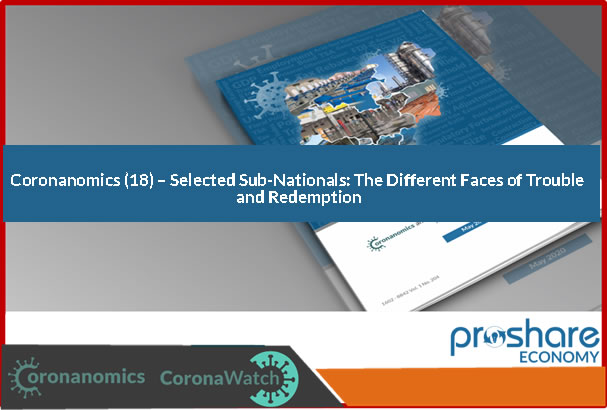
 2833 views
2833 views


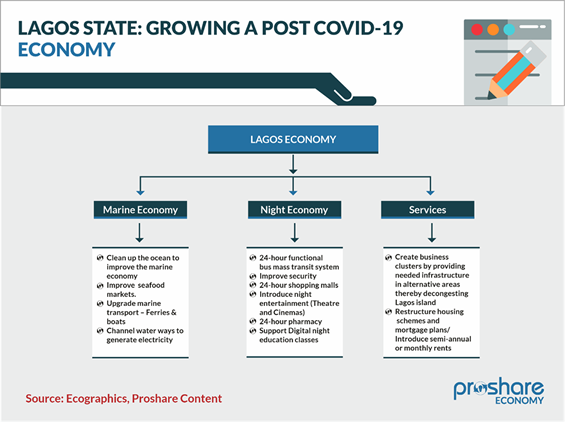

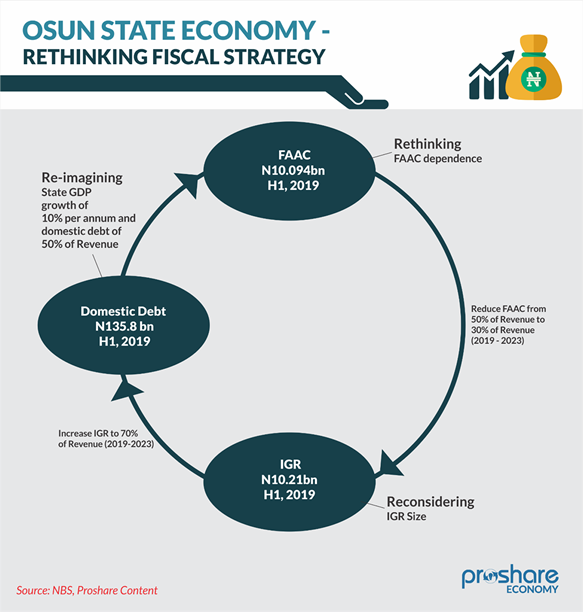
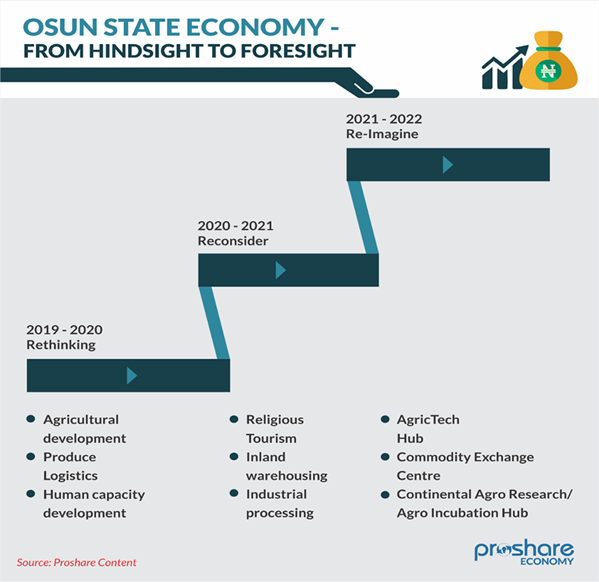



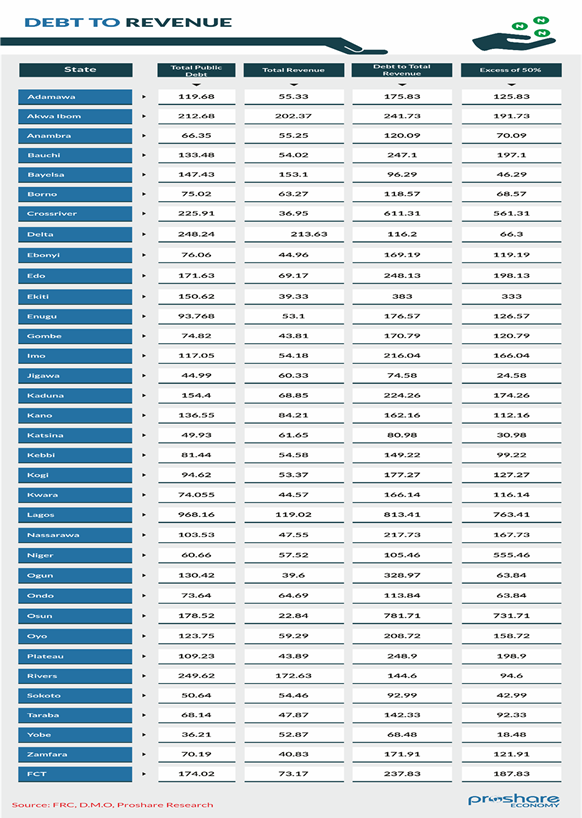
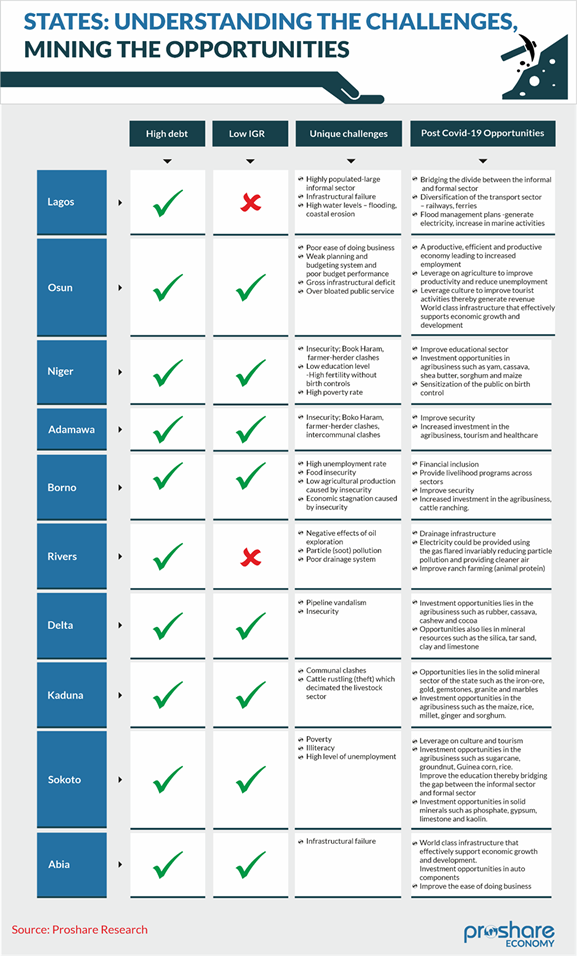

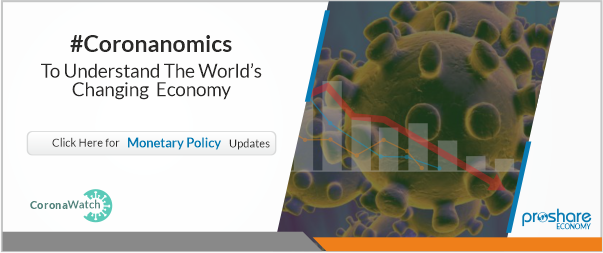

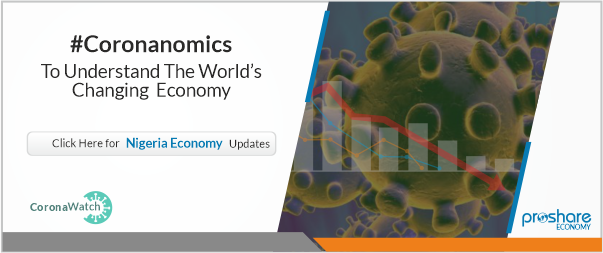


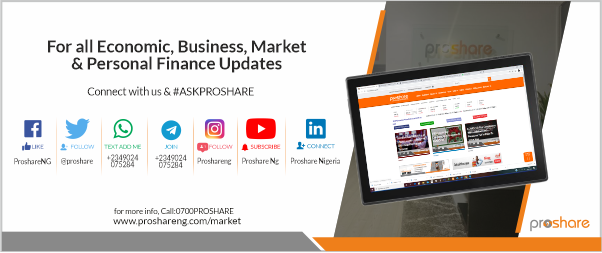





 Sponsored Ad
Sponsored Ad
 Advertise with Us
Advertise with Us









